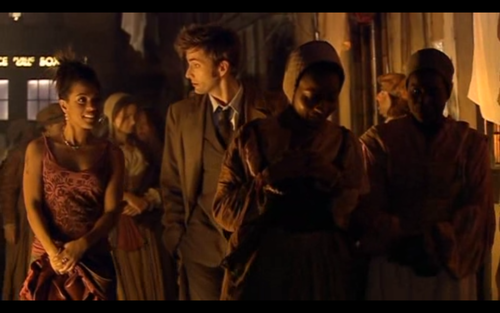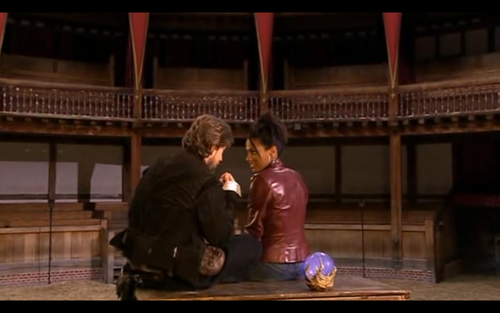But despite evidence of some 200 Africans living in Tudor England, from Hull to Truro, we do not find it represented in popular presentations of the period, such as Elizabeth, Elizabeth: The Golden Age, The Tudors, The Other Boleyn Girl, Wolf Hall, to name but a few.
Strangely enough, a better representation comes from an unexpected source: a 2007 episode of Doctor Who!
The Shakespeare Code starred David Tennant as the Doctor, and Freema Agyeman as his companion Martha Jones. Agyeman is half Iranian and half Ghanaian, and this meant the writer, Gareth Roberts, had to consider how this would play out when she time travels to Elizabethan England. When Martha realises she has just arrived in London in 1599, she has the following exchange with the Doctor:
MARTHA
Oh, but hold on. Am I all right? I’m not gonna get carted off as a slave, am I?
THE DOCTOR
Why would they do that?
MARTHA
Not exactly white, in case you haven’t noticed.
THE DOCTOR
I’m not even human. Just walk about like you own the place. Works for me. Besides, you’d be surprised. Elizabethan England, not so different from your time.
At this point, two African women walk past them. In a few moments, this scene makes two important points:
1) There was a black presence in Elizabethan London
2) The Africans in Elizabethan London were not treated as slaves
These are two points I try to convey in my work. Africans can be found in the parish registers, tax returns, court records and letters of Elizabethan London. There was no law of slavery in England. Furthermore, Africans were paid wages, baptised, married, allowed to testify in court: all indicators of freedom. In 1587, Portuguese physician Hector Nunes admitted to the Court of Requests that he had: ‘no remedie…by the course of the Common Law of this realme... to compell’ an 'Ethiopian' who 'utterly refuseth to tarry and serve' him 'to serve him duringe his life.'
Far from being carted off as a slave, Martha finds herself being courted by Shakespeare himself.
This being Doctor Who, our heroes must then save the world from some aliens disguised as witches. But in the closing moments, the script makes another interesting reference. Shakespeare bids farewell to Martha: 'Martha, let me say goodbye to you in a new verse. A sonnet for my Dark Lady. Shall I compare thee to a summer’s day? Thou art more lovely and more temperate...' The quote is from Sonnet 18, rather than one of the Dark Lady sonnets (127-154), but the suggestion is nonetheless raised that Shakespeare was inspired to write these poems by an African woman. This has been the subject of much scholarly debate-while some insist the lady merely had dark hair, others suggest that the sonnets should be renamed the “Black woman sonnets”. The idea that the Dark Lady was of African origin also makes a cameo appearance in Zadie Smith's White Teeth (2000). In Chapter 11: The Miseducation of Irie Jones, Irie asks her teacher Mrs. Roody if the “dark lady” is “black”. Mrs Rooney replies:
No dear, she's dark. She's not black in the modern sense. There weren't any… well, Afro-Carri-bee-yans in England at that time, dear. That's a more modern phenomenon, as I'm sure you know. But this was the 1600s. I mean I can't be sure, but it does seem terribly unlikely, unless she was a slave of some kind, and he's unlikely to have written a series of sonnets to a lord and then a slave, is he?
A miseducation indeed! As the Doctor could have told Irie's teacher, 'you’d be surprised. Elizabethan England, not so different from your time.'
You can watch The Shakespeare Code online here.


 RSS Feed
RSS Feed
